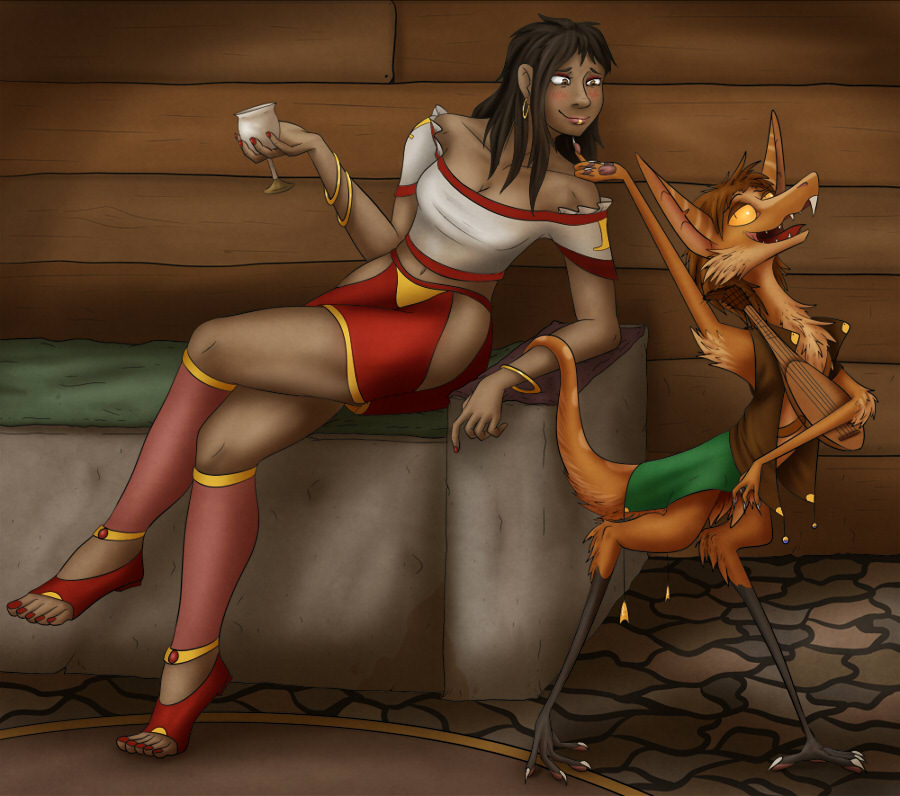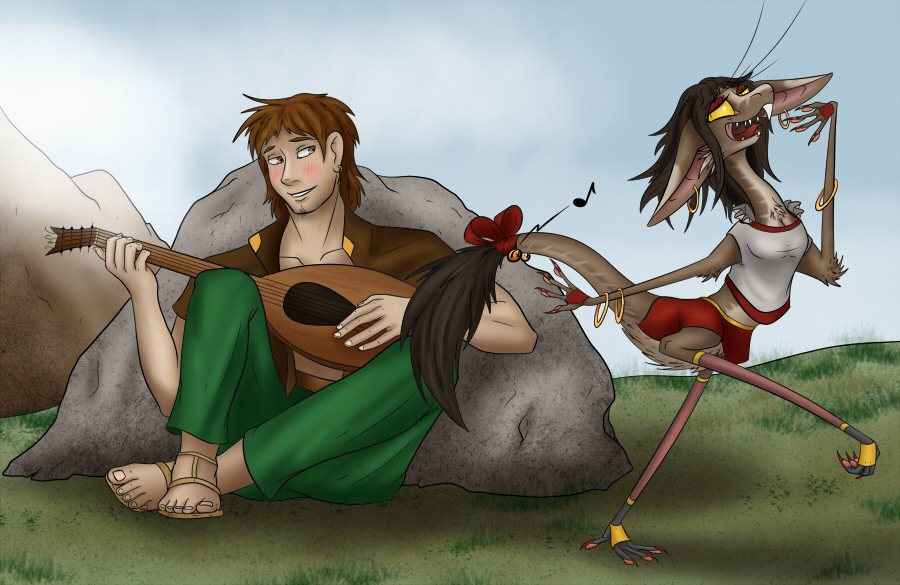Interspecies Relations

As “The Entertainment” of a modest traveler’s inn, neither the bard or the dancer were likely to see any respect from the inn’s many patrons, who would likely only stay one night and never be seen again, giving them the mental excuse to be on their worst behavior.
She was used to the shameless ogling and lack of respect that accompanied her profession; bards, however, were hardly ever hassled and looked down upon as much as the local one. But this one was a yinglet, and only children could look at one without quite literally looking down on them.
Still, there was no doubt that he was a lot better with his small lute than the old human one who he’d replaced several months earlier, despite his awkward arms and one less finger on each hand. He also seemed to know how to play the crowd much better, sensing the mood and rolling with it, unlike the previous one who was constantly distracted by slight interruptions.
This one also seemed much more confident despite his size, carrying a cocky sort of confidence about him, yet somehow lacking the arrogance that she was used to seeing in that particular mix.
On the day of his arrival, he immediately set upon her with questions about her preferred style and tempo in order to better compliment her dancing, unlike the previous one, who had assumed (wrongly) that she would dance to any tune he played without any difficulty. And since then, he had spent more time speaking with her each night, growing more confident and bold in his obvious interest in her.
She thought it harmless and cute at first, but she quickly realized that while her patrons were rude and expectant of her attention, the little bard lavished her with the highest praises, and sweetly-worded serenades that made her heart soar.
Perhaps it was the pleasant mood in the inn that evening, or the quality of the wine, but as he placed his finger under her chin and called her “his flawless morning-rose” with the tone of a smitten lover, she realized with a startle that she liked the sound of that.
“Wait,” she thought, “…with a scav?”
And after a pause, came the suddenly obvious conclusion to that question.
“…Why not?” she thought, blushing deeply, as a serene smile found its way upon her face.

It had been going so well. The dancer and her partner, the diminutive yinglet bard, had discovered an unexpected appreciation for each other, and had grown intimate in their time spent performing at the inn.
And then it happened. Without warning or reason (or at least any they could find), they awoke one morning to find their bodies changed to that of their partner’s species. The once scrawny and furry bard found himself a tall, handsome human, and the once-voluptuous and graceful dancer found herself in the body of a small, twitchy yellow-eyed yinglet.
She was heartbroken, and the bard well understood why, having lived all his life as a yinglet before that moment, and with all the hardships and indignities that came with it. He knew what would follow; and it did.
No one at the inn took the yinglet seriously as she tried to dance like a human with her awkward new form. On the other hand, the handsome new bard drew the attention of all the ladies, who lavished him with attention, as his dancing partner slunk off to the back rooms, humiliated and distraught.
She was close to running away into the night, but he followed her, and promised her that she was still the only one for him… and moreover, he found her more beautiful than ever. She was a bit confused as he bashfully admitted how taken he was with her long neck, her thin forelegs and the thickness of her tail puff. Likewise, he didn’t seem to understand why his broad shoulders, his chiseled jaw and boyish grin had drawn so many human women to him.
In the following days, no one could explain why the handsome bard was so entranced by the dancing scav’s hopping, leggy movements, which to everyone else seemed quite ridiculous. Yet he fawned over her, complementing her style, and suggesting all sorts of strange things such as how to move her tail, and how delightful it would be if she attached bells to herself that would jingle with her movements.
While the bard was clearly impressed with her, the customers were not nearly as impressed with the new dancer (other than a few with unusual tastes), and so it wasn’t long before the innkeeper showed her the door. Against the innkeeper’s wishes, the popular new bard refused to partner with anyone but the yinglet, and politely excused himself from the establishment as well.
And so they traveled, performing at trading posts and campfires, held to no one’s standards but their own. While both were uncomfortable with their new forms, they soon began taking pride in their partner’s compliments; he began to enjoy playing the part of the cool, powerful human, and she became less embarrassed by her easily-excited and overly-perky new nature.
As they eased into their new roles, they found a new depth of appreciation for one another, and began to discover their new selves with great enthusiasm.
Then one afternoon, as they took a break from their travels, the dancer grinned and requested an upbeat, plucky song from her partner; a great difference from the slower, more “dignified” tunes she grew up with. As he played the first few notes, she let go of her worries, and danced around happily without a care, letting her new species’ childish excitement wash over her.
The bard blushed hard at the display, and continued the tune with a swell of happiness in his heart as his lover danced joyously and without restraint to his tune.
They had briefly lost themselves, but had now found themselves exactly where they wanted to be.